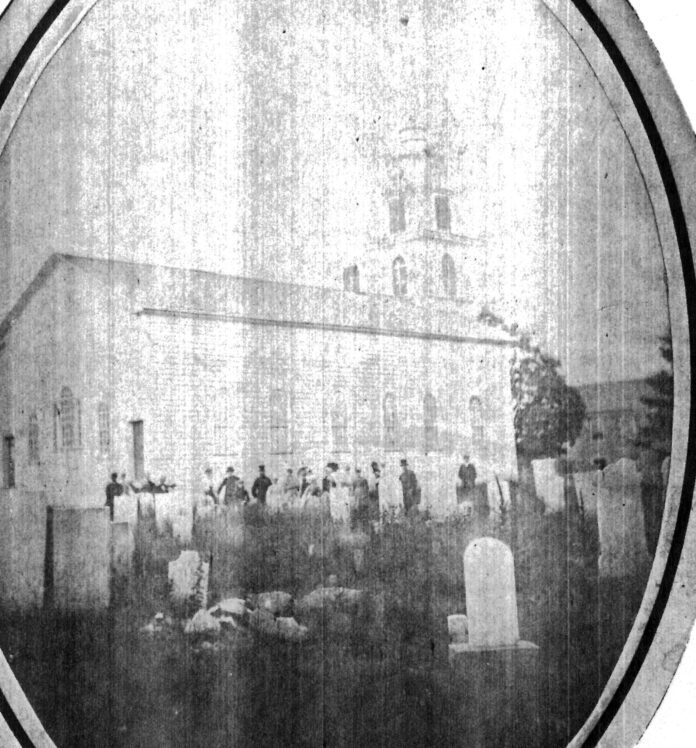

In November, 1839, an Anglican travelling missionary named Morris toured the northern townships of Upper Canada and reported to the Bishop of Quebec on what he found. The places he visited were mostly the townships between the Rideau and the Ottawa Rivers, but included Oxford, South Gower, Wolford and Marlborough. His report included the following status report by Henry Patton (also spelled Patten in the records), resident minister in Kemptville and Secretary of the Clerical Association in Upper Canada (spelling is as in the original):
Rectory of Kemptville, Rev. H. Patten. Mr. P. reports. “The Townships in which I officiate, either regularly, or occasionally, are Oxford, Marlborough, Wolford, North and South Gower, and comprise a tract of country nearly forty miles long, and varying in breadth from ten to twenty miles, with an aggregate scattered population of 5000 Souls. In the five Townships I have seven preaching stations, and to do Justice to the people I ought to have twice as many more, but it is morally impossible to extend my labour. The two extreme Stations at which I preach are distant thirty six miles.
The Township of Oxford contains about two thousand Inhabitants, of whom nearly one third I believe belong to my charge; In this township is situated the Village of Kemptville, where I reside; here we have a neat Church, with a Bell, and a Burial ground well enclosed. This Township alone would amply employ the best efforts of one Clergyman, as there ought to be divine service performed in three different places within its limits.
Marlbrough. Here is a handsome frame Church, and a Burial ground well enclosed. The Township contains about eight hundred Inhabitants, half of them, or more, belonging to the Church, only a part of this Township is under my care, the rest being attached to Richmond on account of its Proximity.
In Wolford is situated the Village of Merrickville, where the people, by great and praiseworthy exertions, have succeeded in erecting a handsome stone Church. This Township contains about fourteen hundred Inhabitants. Besides the congregation in, and about Merrickville, there is a Station for Divine Service seven or eight miles beyond the Village. Here is great and pressing need for the Services of a resident Clergyman.
Merrickville is sixteen miles from my residence, I have never been able to afford it service more than once a fortnight, and that always in the evening.—During the past Winter, the Rev. W. Wait, has officiated in a very zealous and efficient manner at this place, and the neighbouring Station, once in four weeks.
South Gower. The Church families here are but few in number, but North Gower contains between five and six hundred Inhabitants, a large proportion of whom attach themselves to my Cure—and I am fully persuaded a very large congregation might be formed here, if a Clergyman could attend them every Sunday. At present Mr. Wait visits them once in four weeks on Sunday, and his services have been highly appreciated. His attendance however will end in May.
These five Townships then are partially supplied—it is however indeed but partially, and in a degree utterly inadequate to the wants—for where the sphere of labour is so extensive, occasional visits which cannot be followed up by pastoral intercourse, and pastoral supervision, will do little more than keep together the zealous members of the Church—and cannot be expected to retain much influence over the young and the thoughtless.”
Mr. Patten desires especially to remark for your Lordship’s Information, “that the expectation of having a Clergyman stationed among them at Merrickville, rendered the people much more zealous in erecting their Church, and a desire of seeing their Spiritual wants more effectually supplied, as well as relieving myself from a part of a laborious charge far too extensive for my strength, makes me equally anxious to see a Clergyman stationed there.”
The editor who published this material noted:
“I may add here that I am informed by the Bishop, the roads, and modes of communication, in the districts are worse than in almost any other part of Canada, which makes the Duties of the Travelling Missionary more necessary, rendering it impossible for the fixed Clergy to devote the time required for visiting the remote and scattered Settlers, with justice to their own flocks.”





